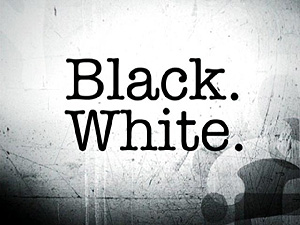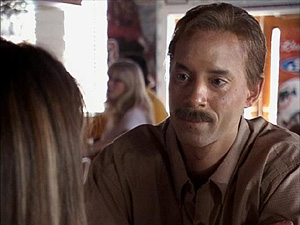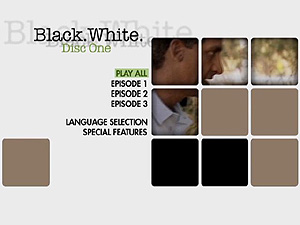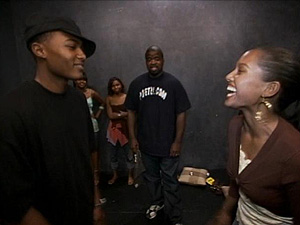| Reviews & Columns |
|
Reviews DVD TV on DVD Blu-ray 4K UHD International DVDs In Theaters Reviews by Studio Video Games Features Collector Series DVDs Easter Egg Database Interviews DVD Talk Radio Feature Articles Columns Anime Talk DVD Savant Horror DVDs The M.O.D. Squad Art House HD Talk Silent DVD
|
DVD Talk Forum |
|
|
| Resources |
|
DVD Price Search Customer Service #'s RCE Info Links |
|
Columns
|
|
|
Black. White.
Black is white, white is black, concept is not execution
 Reviewer's Bias*
Reviewer's Bias*
Loves: Good documentaries, interesting concepts
Likes: Make-up effects
Dislikes: Carmen, Bruno, Sheltered people
Hates: Racism as entertainment
The Show
It's a basic truth that, no matter the intent, new technologies have both positive and negative capabilities. The infinite communications possibilities inherent in the Internet has brought us AmIHotorNot.com. Sophisticated fabrication capabilities have brought us spinnerz hub caps. And advances in special effects make-up have brought us White Chicks. With their series "Black. White." though, FX has provided the possibility for positives via latex. Taking a black family and a white family, putting them in a house, switching their races, and watching what happens when people stop being polite and start being real, this series brought a very interesting concept to TV.
Once it got there, the results were less interesting than one might expect, for a number of reasons, including the cast. Carmen and Bruno, and their daughter Rose are the Wurgels, an upper-middle class white family from Santa Monica, California. Brian and Renee, and their son Nick, are the Sparks, a black family, at least middle-class, hailing from Atlanta, Georgia. They are brought together in one house in Calfornia, and given a race reversal, via some impressive make-up work. It doesn't always look perfect, but it's at least passable, and it's impressive considering it has to work in a number of conditions, unlike most movie make-up. Bruno and Renee make the least obvious switches, while Nick looks like a clone of Michael Jackson, which is creepy no matter which race he started as.
If they had been forced to live together as their new race, it would have been interesting to see if it affected their behavior, but it feels like they take any opportunity to get back to normal or to tell people they meet that they aren't who they look like. If the whole point was to see what it was like to live in someone else's skin, why do they almost immediately tell people the truth? The longer they were around people in their new identities, the more likely some uncomfortable truth would come out, making for a better show. That didn't seem to matter though, as the color swap is used mainly as an introduction, so they can infiltrate a group or area.
 Also frustrating is the probably effect of the cameras which record the scenes. No explanation is given for why they are there (at least none that I noticed), so it's very likely that people were not acting naturally, except in the hidden camera moments. It may just be my obsessive personality, but I kept wondering what these people thought when they saw camera crews following the families. The only time it made sense to have cameras was inside the house, but that's where the behavior felt most forced, in a "Real World" kind of way. It made no sense why these people were arguing like they were on a Sunday-morning talk show, instead of like housemates. Throw in the frequent questions asked by the Wurgels, especially Rose, and the influence of scripting felt a bit apparent.
Also frustrating is the probably effect of the cameras which record the scenes. No explanation is given for why they are there (at least none that I noticed), so it's very likely that people were not acting naturally, except in the hidden camera moments. It may just be my obsessive personality, but I kept wondering what these people thought when they saw camera crews following the families. The only time it made sense to have cameras was inside the house, but that's where the behavior felt most forced, in a "Real World" kind of way. It made no sense why these people were arguing like they were on a Sunday-morning talk show, instead of like housemates. Throw in the frequent questions asked by the Wurgels, especially Rose, and the influence of scripting felt a bit apparent.
A few episodes in, besides a sense of repetition in the exploration of the concept (Renee's frustrated, Carmen's dumb, Brian's frustrated, Bruno's dense, Nick's a thug, Rose does poetry, repeat), it feels like the show is being steered in a specific direction, and that's the education of the Wurgels in the ways of racism. I don't know if they were cast because they are extremely naive or great actors, but they say some of the stupidest things I've ever heard said about race. I half-expected one of them to ask Brian if he washed good enough, because he looked dirty. The Wurgels motivation for the series, depicted through interviews and their on-screen actions, seems to be asanthropologists studying these strange creatures known as "black people." It's hard to believe that their are people this sheltered at this point in history, though Bruno does manage to introduce a few interesting topics at times. The Sparks on the other hand, seem to be seeing what is considered obvious in their travels, though Brian continually struggles to find much real racism, no matter how hard he tries
Despite the show's troubles, it does succeed in spots, one of the biggest being its depiction of the generation gap in terms of racism. Rose and Nick don't share the same views as their parents, and racism almost seems less important to them. Nick's unwillingness to even see racism in his life leads the show to change gears with him, and actually apply to him some of the education being used on the Wurgels. Because of that, the series loses some of its overall punch, but it does break the show's guiding tenant a bit. It also involves another of the show's successes, which is showing the subtle racism in privileged white kids co-opting black culture. In one of the most disturbing scenes, Rose's white friends put on "gangsta" affectations in front of the "white" Nick, urging him to "be black," in a way that'swholly reminiscent of the minstrel shows. The scary thing is, when called upon it, they aren't at all apologetic. It would have been interesting to see where the white kids' learned their behavior, but considering a rap star is behind the show, it's unlikely that the exploration would have gone too deep.
 The DVDs
The DVDs
"Black. White." is a two-disc release, packaged in a standard-width keepcase with a second tray and an insert episode guide. The animated full-frame main menu offers a play-all option, episode selections, special features and languages. Select a menu, and you'll get a healthy spread of chapter stops and a commentary choice. Language options include censored and uncensored Dolby Digital 2.0 tracks (though the F bomb is still bleeped), and English and Spanish subtitles. Word of warming to those watching with the censored audio track: the subtitles are not censored.
The Quality
This series used a variety of camera and media to capture the footage, and as a result, the full-frame transfers vary in quality from scene to scene. When it's good, the video is crisp , detailed and colorful, with the only negative sbeing the noise that's noticeable around thin lines and some oversaturation in spots. Other scenes, normally the ones not shot under controlled conditions, suffer from a dullness and higher level of video noise. Overall, considering the limitations of the source material, these discs look nice.
The audio, presented in Dolby Digital 2.0, is good, basic-cable sound, without anything in terms of dynamic sound, but the whole package is clean and clear. The incidental music comes across nicely, but without a lot of strength, while the dialogue is easy to understand. When the recording does falls short, due to mic placement or whispering, subtitles are presented.
The Extras
Each of the six episodes has an audio commentary by RJ Cutler, who developed the show for TV as an executive producer. On the first three episodes, he's joined by two of the cast members, first the husbands, then the wives, then the kids. The cast provides updates and insights, while Cutler acts as moderator, prodding them for details. On the final three episodes, Cutler is joined by the crew, delivering more technical commentaries. The make-up team goes first, followed by the editors, then co-executive producer Keith Hoffman. Combined, these tracks give you a good idea of what it took to get this show on the air, but in a very orderly way that a mass commentary would have failed to produce. The only downside is not hearing from Ice Cube, to get his thoughts on the show.
Disc One includes almost 20 minutes of casting videos from the two families. It wasn't until I watched these videos that I got a full understanding of the dynamics of the families, which gives the series a bit of a different tone. It's also interesting to see how different the two tapes are in terms of how they were produced and the content. There's also five minutes of footage from the Sparks' "Life Casting," during which molds were made of their heads. This stuff has been done on other FX-heavy DVDs, but it's still pretty amazing. I don't think I could handle being so enclosed. You can see the results and more of the sessions in a photo gallery.
Disc Two presents a few more short extras, starting with video from Rose's poetry slam, which she performed in the final episode. If you're interested in poetry, this might be worth a look. The collection wraps up with a music video for "Black. White." by Ice Cube. It's a decent, if simplistic song, and the video is good enough to entertain for a viewing.
Popping these discs into your DVD-ROM drive allows you to access study guides for the series and the individual episodes, which are joined by access to specific clips on the DVD. For a teacher covering the topic of race or family, these are very welcome tools.
 The Bottom Line
The Bottom Line
The make-up effects, though not entirely convincing, are done well enough to make this series a curiosity worth a viewing. Once you get past that facet of the show though, there's not enough meat behind the concept to maintain interest, as the episodes become repetitive instead of revealing. The DVDs, on the other hand, are well-produced, with a good spread of appropriate, educational and informative extras, giving the show a better treatment than most series get. It may not require a spot on most people's shelves, but it deserves consideration for a spin, especially in classrooms, where it might spark some positive discussion.
Francis Rizzo III is a native Long Islander, where he works in academia. In his spare time, he enjoys watching hockey, writing and spending time with his wife, daughter and puppy.Follow him on Twitter
*The Reviewer's Bias section is an attempt to help readers use the review to its best effect. By knowing where the reviewer's biases lie on the film's subject matter, one can read the review with the right mindset.
|
| Popular Reviews |
| Sponsored Links |
|
|
| Sponsored Links |
|
|
| Release List | Reviews | Shop | Newsletter | Forum | DVD Giveaways | Blu-Ray | Advertise |
|
Copyright 2024 DVDTalk.com All Rights Reserved. Legal Info, Privacy Policy, Terms of Use,
Manage Preferences,
Your Privacy Choices | |||||||














